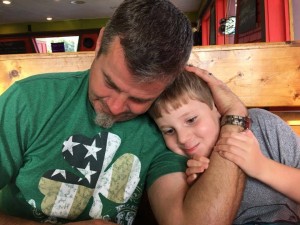 A couple of weeks ago, I listened to a conversation between parents of autistic children. The first – a mother and father – were relating their experiences as parents of a severely autistic, nonverbal child with intellectual disability and discussing how they love, enjoy, and accept their son as the person he is.
A couple of weeks ago, I listened to a conversation between parents of autistic children. The first – a mother and father – were relating their experiences as parents of a severely autistic, nonverbal child with intellectual disability and discussing how they love, enjoy, and accept their son as the person he is.
The second – a mother of an autistic adult – interrupted them with oversimplified advice to “just [insert unsolicited opinions] and he’ll be fine”, noting that her child is “now married and doing fine”. She finished with “You’ll see. Don’t give up hope.”
The parents of the severely disabled child were a class act while struggling to not argue with the woman they clearly saw as well-intentioned. But I knew what that patience was costing them on the inside. I know what being on the receiving end of such advice really feels like.
And it has nothing to do with resentment that her child is doing so well in life. It has everything to do with a pervasive belief that somehow accepting the limitations of a severe disability is “giving up” on a child. You hear this mantra from friends, neighbors, educators, etc., but it’s worse when it comes from a fellow special needs parent.
My son has a severe disability that places him in the “highest needs” category. He is considered functionally nonverbal, severely autistic, and intellectually disabled. He is old enough now and has had enough supports in place that we can make some realistic, informed predictions about future supports and transitional planning. Is it possible we’ll be wrong? Sure. But with all things considered, it’s not likely.
What I want to know is how is my acceptance of who he is “giving up” on him? The implication is he’s somehow a failure if we do “give up” and he doesn’t achieve what others believe is necessary for him to be a successful human being. Is he a failed soul should he not grow up to go to college or marry? Is he our failure if his brain simply isn’t wired to do those things?
Is a paraplegic a failure if his spinal cord fails to regenerate? No? Then why is my child a failure if his brain fails to form neurological connections? Where did anyone get the idea that all we have to do is “believe” to alter a person’s physiology?
If you know or love someone who overcame early developmental challenges but went on to live a fairly typical life, that’s great. I’m honestly very happy for them. It makes life easier if you can go that route. But do the rest of us a favor and cease insinuating we aren’t doing something right if it’s not in the cards for our loved ones. My son’s future is ultimately not going to be the result of “just believing” in him. I already believe in him. I believe he is delightful. I believe his soul is beautiful. I believe he has dignity. And, unlike those who tell me to not “give up hope”, I believe he is worthy – just as he is.
So, am I giving up “hope”? You’re damned right I am. I’m giving up hope of him being anyone other than the amazing person he already is. I’m giving up “hope” in unrealistic dreams of futures he isn’t likely to have, and I’m replacing it with genuine hope for him to be the happiest him he can be. And I’m doing that with all of the IEP goals, therapies, love, and exposure to his world that I can pack into his formative years. But in the end, he’s going to be who he is meant to be. It’s good enough for me. It ought to be good enough for everyone else.
And, no. I’m not going to give up hope for that.





